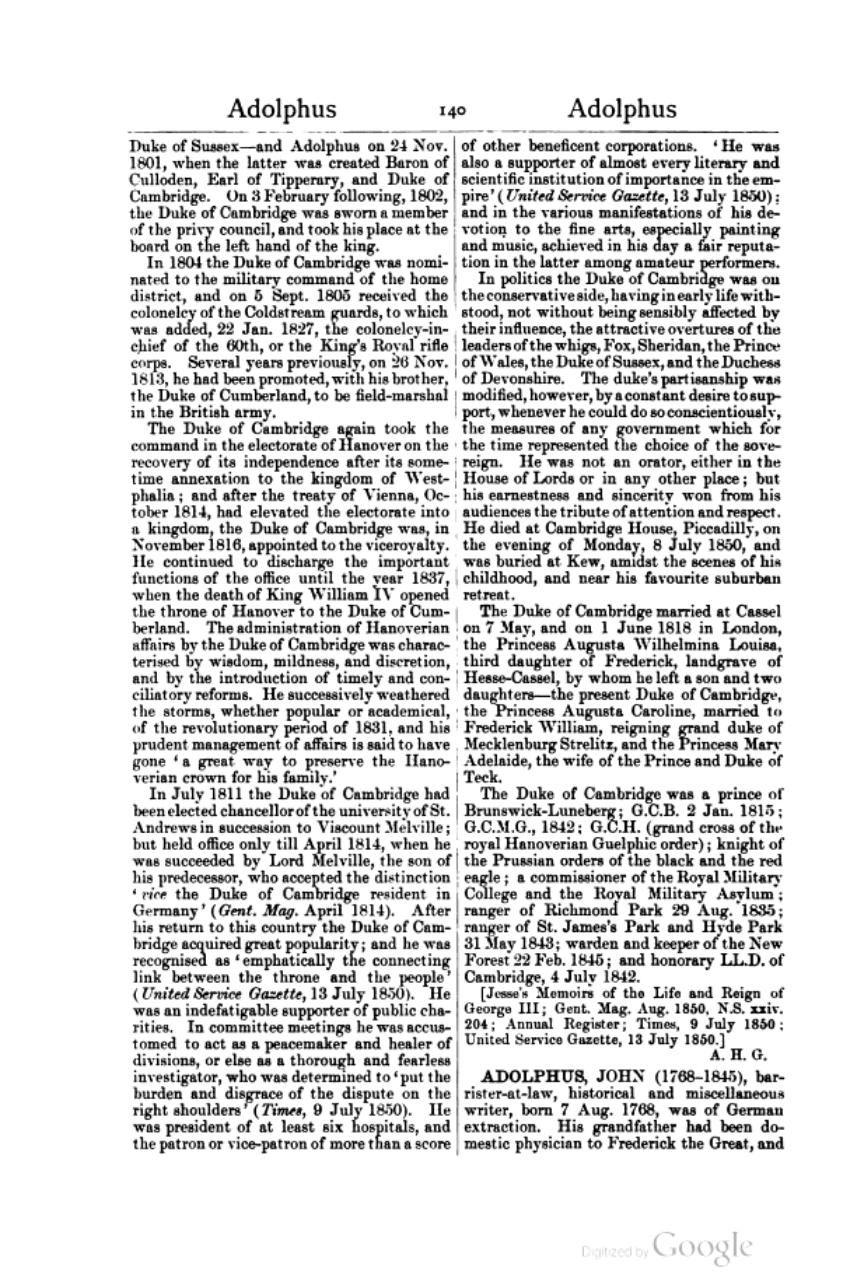Duke of Sussex—and Adolphus on 24 Nov. 1801, when the latter was created Baron of Culloden, Earl of Tipperary, and Duke of Cambridge. On 3 February following, 1802, the Duke of Cambridge was sworn a member of the privy council, and took his place at the board on the left hand of the king.
In 1804 the Duke of Cambridge was nominated to the military command of the home district, and on 5 Sept. 1805 received the colonelcy of the Coldstream guards, to which was added, 22 Jan. 1827, the colonelcy-in-chief of the 60th, or the King's Royal rifle corps. Several years previously, on 26 Nov. 1813, he had been promoted, with his brother, the Duke of Cumberland, to be field-marshal in the British army.
The Duke of Cambridge again took the command in the electorate of Hanover on the recovery of its independence after its sometime annexation to the kingdom of Westphalia; and after the treaty of Vienna, October 1814, had elevated the electorate into a kingdom, the Duke of Cambridge was, in November 1816, appointed to the viceroyalty. He continued to discharge the important functions of the office until the year 1837, when the death of King William IV opened the throne of Hanover to the Duke of Cumberland. The administration of Hanoverian affairs by the Duke of Cambridge was characterised by wisdom, mildness, and discretion, and by the introduction of timely and conciliatory reforms. He successively weathered the storms, whether popular or academical, of the revolutionary period of 1831, and his prudent management of affairs is said to have gone ‘a great way to preserve the Hanoverian crown for his family.’
In July 1811 the Duke of Cambridge had been elected chancellor of the university of St. Andrews in succession to Viscount Melville; but held office only till April 1814, when he was succeeded by Lord Melville, the son of his predecessor, who accepted the distinction ‘vice the Duke of Cambridge resident in Germany’ (Gent. Mag. April 1814). After his return to this country the Duke of Cambridge acquired great popularity; and he was recognised as ‘emphatically the connecting link between the throne and the people’ (United Service Gazette, 13 July 1850). He was an indefatigable supporter of public charities. In committee meetings he was accustomed to act as a peacemaker and healer of divisions, or else as a thorough and fearless investigator, who was determined to ‘put the burden and disgrace of the dispute on the right shoulders’ (Times, 9 July 1850). He was president of at least six hospitals, and the patron or vice-patron of more than a score of other beneficent corporations. ‘He was also a supporter of almost every literary and of scientific institution of importance in the empire’ (United Service Gazette, 13 July 1850); and in the various manifestations of his devotion to the fine arts, especially painting and music, achieved in his day a fair reputation in the latter among amateur performers.
In politics the Duke of Cambridge was on the conservative side, having in early life withstood, not without being sensibly affected by their influence, the attractive overtures of the leaders of the whigs, Fox, Sheridan, the Prince of Wales, the Duke of Sussex, and the Duchess of Devonshire. The duke's partisanship was modified, however, by a constant desire to support, whenever he could do so conscientiously, the measures of any government which for the time represented the choice of the sovereign. He was not an orator, either in the House of Lords or in any other place; but his earnestness and sincerity won from his audiences the tribute of attention and respect. He died at Cambridge House, Piccadilly, on the evening of Monday, 8 July 1850, and was buried at Kew, amidst the scenes of his childhood, and near his favourite suburban retreat.
The Duke of Cambridge married at Cassel on 7 May, and on 1 June 1818 in London, the Princess Augusta Wilhelmina Louisa, third daughter of Frederick, landgrave of Hesse-Cassel, by whom he left a son and two daughters—the present Duke of Cambridge, the Princess Augusta Caroline, married to Frederick William, reigning grand duke of Mecklenburg Strelitz, and the Princess Mary Adelaide, the wife of the Prince and Duke of Teck.
The Duke of Cambridge was a prince of Brunswick-Luneberg; G.C.B. 2 Jan. 1815; G.C.M.G., 1842; G.C.H. (grand cross of the royal Hanoverian Guelphic order); knight of the Prussian orders of the black and the red eagle; a commissioner of the Royal Military College and the Royal Military Asylum; ranger of Richmond Park 29 Aug. 1835; ranger of St. James's Park and Hyde Park 31 May 1843; warden and keeper of the New Forest 22 Feb. 1845; and honorary LL.D. of Cambridge, 4 July 1842.
[Jesse's Memoirs of the Life and Reign of George III; Gent. Mag. Aug. 1850, N.S. xxiv. 204; Annual Register; Times, 9 July 1850; United Service Gazette, 13 July 1850.]
ADOLPHUS, JOHN (1768–1845), barrister-at-law, historical and miscellaneous writer, born 7 Aug. 1768, was of German extraction. His grandfather had been domestic physician to Frederick the Great, and
